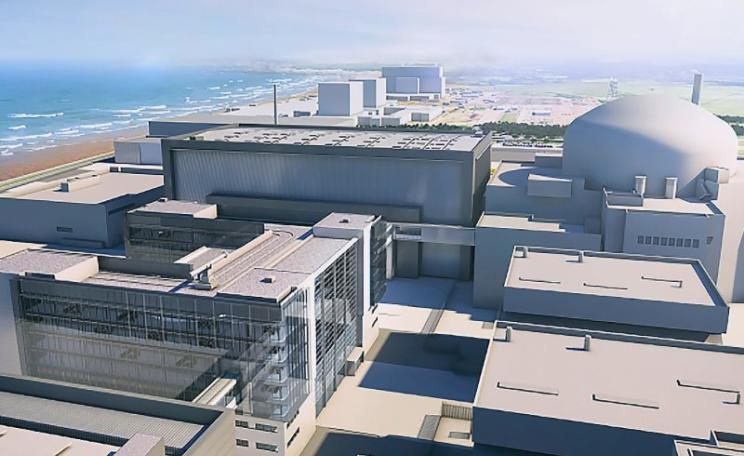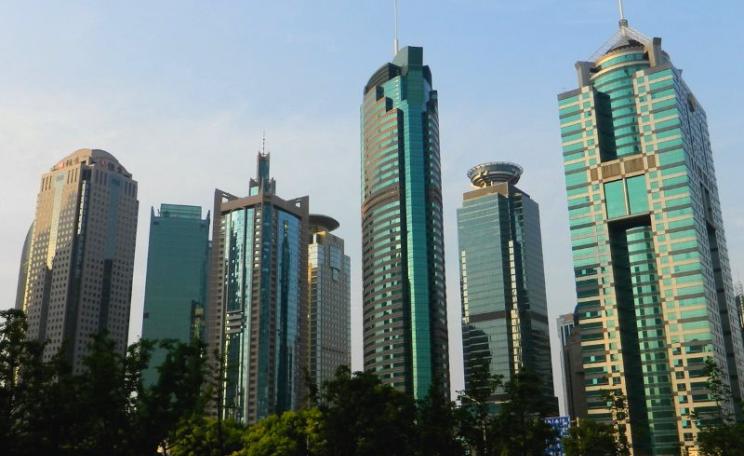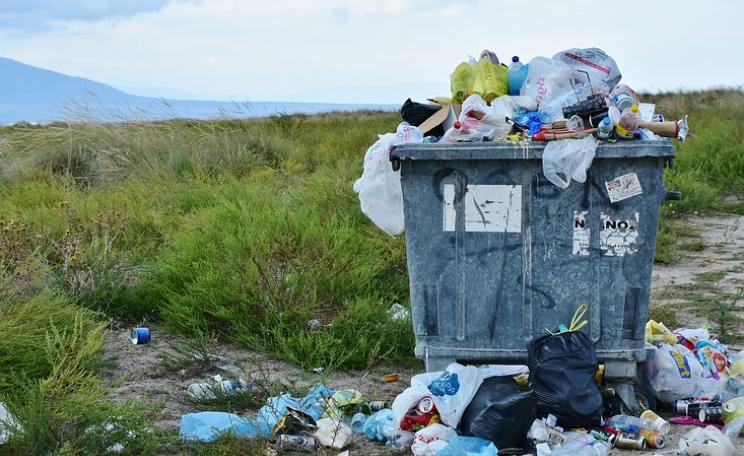What could they do? They might, on command, turn a nuclear power station into a 'dirty bomb', like a deliberate Fukushima or Chernobyl nuclear disaster, deliberately timed to carry the fallout to London and make the city uninhabitable for a generation.
Tomorrow China's President Xi is expected to sign a series of commercial agreements on Wednesday consolidating China's inward investment into UK infrastructure. The jewel in the crown will be Chinese backing for new nuclear power.
The twin reactor Hinkley C, Britain's first new nuclear power plant since 1995, is to be built by a company jointly owned by the French parastatal EDF Energy and two Chinese parastatal nuclear corporations, co-financed by the Chinese State Investment Bank, for a total current cost of an eye-watering £24.5 billion.
It's a deal that matters an enormous amount to the hyper pro-market chancellor George Osborne, one for which he elbowed aside his energy secretary Amber Rudd, to take over the nuclear deal with Beijing, which he and David Cameron started two years ago with their charm offensive visit to China.
Osborne said at the fifth UK-China Economic Financial Dialogue on 15 October 2013 - which followed a visit to China the previous month by then energy secretary Ed Davey to smooth the way:
"Britain and China are partners in growth. In the agreements we have made today and the other deals I am announcing this week, we are showing how Britain and China are taking the next big step in our relationship. It means more trade, more investment and more jobs. More jobs in Britain. More jobs in China. And from services to science, from infratrastructure to innovation, we are working together and creating ties between our countries.
"We embrace these opportunities on the basis of shared interests, greater understanding and mutual respect. That has been my approach to today's dialogue and to the whole of my trip this week."
The nuclear deep state is the same everywhere
Two academics at the Science Policy Research Unit(SRU) at the University of Sussex, Professor Andy Stirling and Dr Philip Johnstone, argue in a recent article that perhaps this very odd and ideologically perverse nuclear partnership can be explained using the concept of the 'deep state'.
The focus in particular on the deep state's overwhelming desire for the UK to remain a nuclear weapons power, and that for that to be sustainable in the long term, we must also maintain a robust civil nuclear programme. Their conclusion: "now is the moment to ask some searching questions about what nuclear policy is doing to British politics."
What could they do? They might, on command, turn a nuclear power station into a 'dirty bomb', like a deliberate Fukushima or Chernobyl nuclear disaster, deliberately timed to carry the fallout to London and make the city uninhabitable for a generation.
A one-time senior British diplomat, Carne Ross - who was the British expert on Iraq at the UN from 1997 to 2002 - developed the idea of the 'deep state' in trying to explain how the Iraq invasion plans could have been covered up, as set out by Anthony Barnett on Open Democracy in 2010.
What is striking about nuclear power development - especially in countries also possessing nuclear weapons - is how similar it has been in all major countries, whether the dominant economic structure is capitalist (US), corporatist (UK and France), State Capitalist / communist or Soviet Union (State Communist (now capitalist). The institutional arrangements and secrecy surrounding the development has mirrored each other across all five states.
In their seminal study The Nuclear Barons, published in 1981, journalist Peter Pringle and political advisor and lawyer James Spigelman, demonstrate how across the political divide "the atom offered each country's decision makers many opportunities to indulge a yearning for power, relish a sense of achievement proclaim a vision for the future ... with decisions often frequently distorted by personal ambition and institutional self-interest."
They went on "As the nuclear revolution expanded, the advocates built special institutions to keep the atom apart from the checks and balances of the normal political process ... the atomic institutions became almost totalitarian in their powers often requiring scientists and engineers to suppress information that stood in the way of the nuclear revolution."
Thus the US created the domineering Atomic Energy Commission (now the Department of Energy), the Soviet Union had the meaningless Ministry of Medium-Sized Machines (now Rosatom), the UK created its Atomic Energy Authority, France its own Atomic Energy Commission (Commissariat a L'Energie Atomique) out of which Areva and EDF grew.
A union of two nuclear deep states?
China Started with Non Ferrous and Rare Metals Company, it developed post war with Soviet Union, and added the Institute of Atomic Energy a few years later: all had primary military nuclear functions, out of which civilian nuclear research, design and development grew.
Last week The Times highlighted UK security service concerns over the security implications of doing nuclear deals with China. "There is a big division between the money men and the security side", a security source told the newspaper. "The Treasury is in the lead and it isn't listening to anyone - they see China as an opportunity, but we see the threat."
Indeed, the China National Nuclear Corporation (CNNC) boasts on its website that it "successfully developed the atomic bomb, hydrogen bomb and nuclear submarines". As Jeffrey Henderson, professor of international development at the University of Bristol, wrote in a recent article:
"One of the companies involved at Hinkley Point - China National Nuclear - produces China's nuclear weapons. This means that as well as the Communist Party, CNNC is almost certainly controlled by the People's Liberation Army (as all Chinese military-related companies are).
"Given geopolitical uncertainty (with rising tensions between China, Japan and the US over China's territorial claims in the East and South China Seas), allowing such a company anywhere near Britain - not to mention in an industry as strategic as power generation - verges on the insane. Has MI5 been consulted on this, and if it has, what was its advice?"
However, Foreign Office minister Hugo Swire sought to allay security fears in a written Parliamentary answer to Labour backbencher Paul Flynn in a reply last Friday (16 October) stating:
"Security in the civil nuclear industry is of paramount importance to the Government. The UK has in place, robust security regulations which are enforced by an independent regulator, the Office for Nuclear Regulation. These regulations cover sensitive nuclear information as well as holdings of nuclear material and nuclear sites. The Government keeps the regulatory framework for security in the civil nuclear industry under continuous review. The Government welcomes Chinese investment to the UK, including in the nuclear energy sector."
What he the omitted to mention is the chief nuclear security and safety inspector, Dr Andy Hall, has just abruptly resigned. Why might that be so? In the worst case scenario, 'malware' - such as trapdoors, backdoors, viruses or worms - could be inserted into the computer programs that run the Chinese-controlled power plants. These would be incredibly hard to detect amid the millions of lines of code.
What could they do? They might, on command, turn a nuclear power station into a 'dirty bomb', like a deliberate Fukushima or Chernobyl nuclear disaster, deliberately timed to carry the fallout to London and make the city uninhabitable for a generation. Remember what Stuxnet did to Iran's uranium centrifuges.
Imagine: you are a British Prime Minister at a time of rising international tension over, say, China's seizure of Spratly Island and the installation of a new missile base. Reports reach you of a dangerous malfunction at one of the Chinese nuclear plants that defies standard emergency procedures.
Then the phone call comes through - ordering you to withdraw all UK military and naval assets from the South China Sea, make a speech denouncing US military adventurism in the region, and cast your Security Council vote to veto an anti-China resolution. What would you do?
Long term planning? Or quick-fix desperation?
In an interview with China Daily published today to mark his visit to Britain President Xi praised Britain's "visionary and strategic choice" to become China's best friend in the West. He added:
"China is ready to pursue cooperation of various forms with the UK and other countries in international production capacity and equipment manufacturing to synergize respective strengths ... There should be no swing doors or glass doors that are placed as non-economic or non-market based barriers."
That last bit was an oblique reference to criticisms of Chinese human rights: whatever concerns the UK may have, they must not get in the way of business. And Osborne is happy with that, clearly determined not to let the niceties of human rights get in the way of his new 'Golden Age' grand project.
In China last month he announced £2bn of new government guarantees for the new Hinkley C project - with UK taxpayers now also liable for around two thirds of the total project cost. With the vast majority of investors put off by the risks associated with the project, critics of the scheme have argued that desperation rather than long-term planning has driven the generous terms delivered to China by the UK.
In his deal struck at last month's seventh UK-China Economic Financial Dialogue, Osborne concluded the following detail:
"22. In the important field of nuclear energy: Both sides welcome the strengthening of the partnership in civil nuclear energy since the signing of the Memorandum of Understanding on civil nuclear energy cooperation dated October 2013.
"The UK side warmly welcomes and supports Chinese investment and participation in the Hinkley Point C project and progressive involvement in the UK nuclear newbuild market, including leading the development of other UK nuclear site(s) as fast as practicable, and supports the deployment of Chinese nuclear reactor technology, subject to meeting the requirements of the UK's independent regulators.
"The China National Energy Administration and the UK Department of Energy and Climate Change agreed to enhance communication with each other with a view to facilitate the enterprises of both sides to explore cooperative opportunities in China, UK and other third countries, and to assist Chinese investors with understanding UK requirements and coordinating on regulatory, legal and electricity market issues, flowing from investment in UK new nuclear build.
"23. The UK and China welcomed the extensive collaboration carried out across the nuclear fuel cycle, including in decommissioning, nuclear fuel transportation, and waste management under the MOU on Enhancing Cooperation in the Field of Civil Nuclear Industry Fuel Cycle Supply signed in June 2014.
"CAEA and DECC will continue to strengthen coordination to support relevant enterprises to secure more tangible results from cooperation in this area and looked forward to the signing of further commercial agreements / contracts."
'We see no conflict' with US 'special relationship. But others do ...
But the Department of Energy and Climate Change is reticent to explain just how these deals will work out in practice, with minister for nuclear issues, Andrea Leadsom, giving the same vague composite answer on 16 October to three probing questions asked last week by Paul Flynn MP, stating:
"The Joint Research and Innovation Centre (JRIC) is envisaged to be the subject of a commercial agreement between the National Nuclear Laboratory and the Chinese National Nuclear Corporation.
"These two organisations are still in the process of negotiating such an agreement and will need to consider details on the structures, funding, governance and accountability of the JRIC. As such, it is too early for Government to be able to comment on the outcomes of such a negotiation.
"We continue to maintain an interest in developments of these discussions and will work, where appropriate, with our counterparts in the Chinese government to ensure that outcomes are mutually beneficial to the research landscape of both nations."
Not all are convinced. The Financial Times reports today that "The plans to open critical UK infrastructure assets up to the Chinese drew private criticism from western diplomats based in Beijing, who criticised Downing Street for 'doing an Osborne': a reference to the chancellor's five-day warm-up tour of China last month when he said the UK should 'run to China'."
It added: "According to several of the diplomats, the regular encrypted cables sent back to European and North American capitals over recent weeks have been filled with snide remarks and criticisms of the UK's kowtowing in the run-up to Mr Xi's state visit."
In an interview with China Central Television on Friday, David Cameron dismissed doubts, asserting: "We see no conflict with having that very special relationship (with the United States), with wanting to be a strong partner for China as the Chinese economy continues to grow and China emerges as an enormous world power."
Be very, very careful
But the truth is that there is every reason for the UK to be very, very careful. What is taking place is no union of equals, but one in which the UK, as supplicant, is being forced to yield to Chinese industrial and economic power.
And in return for its money, China is getting a lot back: command of critical UK infrastructure; a stonking great foot in the door of our nuclear establishment, with clear links to our nuclear weapons programme; the silencing of criticism on human rights and other divisive issues; a security wedge between the UK and its long-established ally the USA; and the real possibility of nuclear blackmail.
What that all adds up to is a package that is severely prejudicial the UK's future independence and sovereignty and undermines those very 'British values' that our government claims to represent.
Of course what is taking place this week is largely ceremonial. Most of the deals signed will be of the form of 'memoranda of understanding' and 'heads of terms' that are not in themselves legally binding. What really matters is what follows.
And there are obstructions ahead. Legal challenges to the support package for the Hinkley C plant have been filed with the European Court of Justice, and more appear likely to follow in the wake of any firm proposals to support the Chinese involvement at Bradwell and Sizewell.
Those elements of the UK's deep state that are deeply uneasy at the Chinese involvement in the UK's nuclear power stations will also be doing all they can to derail the deal. As old hands in politics and the civil, intelligence, military and security services they are good at getting their way, quietly and effectively.
So never mind the parades and speeches. It may all come to nothing. And for those who believe in a sovereign and independent United Kingdom, we must surely hope it does, and do what we can to that end.
Dr David Lowry is Senior research fellow, Institute for Resource and Security Studies, Cambridge, MA, USA.
Oliver Tickell edits The Ecologist.







